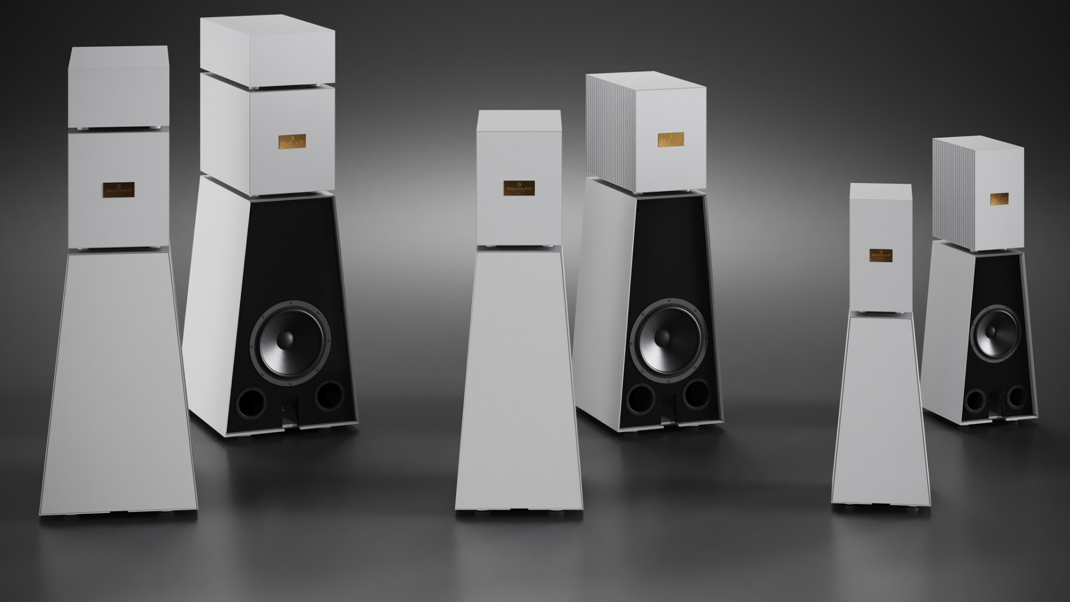Goldmund's trio of high-end active speakers combine legendary looks with Herculean prices
The Asteria, Rhea and Theia active loudspeakers are here

High-end Swiss brand Goldmund clearly has a thing for ancient Greece. Last year, the luxury outfit unveiled the Melos active speakers as a "homage to the melodies of ancient Greece", while the Tethys floorstanders took their name from the ancient Greek Titan who held the role of goddess of fresh water. (Again, thanks Google.)
The mythological names are back with Goldmund's new high-end active speaker series: the Asteria, Rhea and Theia speakers. Each take influence from the legacy of its flagship Gaia model and which, says the maker, "reflect Goldmund's ambition to elevate the listening journey beyond the conventional".
The new models all sport a design inspired by the distinctive shape of the Gaia flagship loudspeakers. All three speakers are constructed using a distinct aluminium alloy paired with matching grilles, while micro-blasted aluminium is used for the vertical and edge enclosure panels.
The Asteria offers a quoted frequency of 34.5 Hz to 25 kHz, powered by integrated Telos amplifiers delivering 600 watts of total power. The most affordable (it's all relative) member of the new line, the Asteria houses a single 25mm soft dome tweeter alongside a 17.7cm midrange and a 22.8cm bass driver. Around the back, there's a single digital S/PDIF input as well as the capacity to simply play audio wirelessly from your given source.
The Rhea, meanwhile, promises a "captivating auditory experience" with a frequency response of 26.5Hz to 25kHz, with the same sized tweeter and mid-range driver but a larger 30cm bass woofer taking care of the lower end. The inputs are the same as the Rhea above, but the more expensive Rhea is considerably larger than the Asteria and more powerful, too, with 2 x 175 watts going to the tweeter and midrange drivers and 30 watts powering the woofer.

The Theia, finally, is seen as "the pinnacle of this triumvirate" and teases a frequency response from 21Hz to 25kHz, this time housing four drivers: a 25mm soft dome tweeter, a 10cm high medium driver, a 15cm low medium driver and a 30cm bass woofer. The biggest and most expensive of the three, the built-in Telos amp uses a total of 425 watts of power for the tweeter and mid-range drivers and 350 watts for the woofer. Again, those physical and wireless inputs remain consistent no matter the speaker chosen.
Every member of this new trio was designed with Goldmund's unique Proteus LS software which "leverages various specifications" to maximise the speakers' performance. They all also take advantage of the brand's Leonardo Time Correction technology which aims to suppress time alterations by digitally realinging signal frequencies. All of this should ensure that the resultant sound is pure, precise and adaptable to the unique acoustics of a given space.
The latest hi-fi, home cinema and tech news, reviews, buying advice and deals, direct to your inbox.
With options for both wired and wireless connections, including a USB dongle for integration with a computer, each speaker's DSP can operate at 24-bit/96kHz high-resolution playback. The new range uses Goldmund’s Mechanical Grounding tech which aims to reduce vibrations and allow for greater resonance from the speakers and the built-in electronics for a more even, natural sound.
The new luxury range of wireless active speakers is available now at some eye-wateringly high prices:
- Goldmund Asteria: £89,000 / $95,000 (Excl. VAT)
- Goldmund Rhea: £137,000 / $150,000 (Excl. VAT)
- Goldmund Theia: £275,000 / $300,000 (Excl. VAT)
Each speaker comes with a default silver enclosure and grilles, although the bespoke options include a black enclosure and grilles, a silver grey enclosure with black grilles or a black enclosure with grey grilles.
MORE:
Goldmund expands its passive speaker portfolio with (more) affordable Melos
Read our recent Goldmund Mimesis 37S NextGen/Telos 300 review

Harry McKerrell is a senior staff writer at What Hi-Fi?. During his time at the publication, he has written countless news stories alongside features, advice and reviews of products ranging from floorstanding speakers and music streamers to over-ear headphones, wireless earbuds and portable DACs. He has covered launches from hi-fi and consumer tech brands, and major industry events including IFA, High End Munich and, of course, the Bristol Hi-Fi Show. When not at work he can be found playing hockey, practising the piano or trying to pet strangers' dogs.
